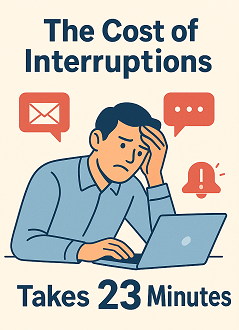We’ve all been there. You’re deep into an important project when an email notification pops up, a coworker pings you on chat, or your phone buzzes. You switch gears for “just a minute,” telling yourself you’ll get right back to your original task. But before you know it, 20 minutes have passed, and when you finally return, you’ve lost your flow. Task switching can often disrupt your concentration.
This isn’t just in your head. Science has proven that interruptions and task switching come with a real and measurable cost.
The 23-Minute Rule: How Long It Really Takes to Recover
Gloria Mark, a researcher at UC Irvine, conducted one of the most well-known studies on interruptions in the workplace. Her team found that after being interrupted, it takes people an average of 23 minutes and 15 seconds to fully return to their original task. This highlights the challenge of task switching, which has more impact than we realize.
Think about that: every “quick” interruption actually sets you back nearly half an hour. And if your day is full of pings, chats, and side conversations, you’re losing hours without realizing it.
Even worse, Mark’s research showed that people try to make up for lost time by working faster once they return. But that comes with hidden consequences:
- Higher stress levels
- Increased frustration
- More mistakes
In other words, interruptions don’t just slow you down — they make you worse at what you’re doing.
Attention Residue: The Mental Drag You Don’t Notice
Another important piece of this puzzle is attention residue, a term coined by Sophie Leroy in 2009.
Here’s how it works: when you stop working on a task and start another, part of your brain stays stuck on the first task. You keep subconsciously thinking about the thing you didn’t finish, which steals focus and energy from the new task. Frequent task switching can exacerbate this problem.
The residue is stronger if the first task was unfinished or mentally demanding. And if you’re switching tasks often, the mental drag piles up, leaving you less sharp and more drained throughout the day.
Why This Matters More Than Ever
In today’s world of constant notifications, open office spaces, and “always-on” work culture, we are interrupted more than any previous generation of workers. The research suggests we’re paying for it with lost productivity, lower quality of work, and rising stress. The continuous task switching adds to this burden.
Interruptions don’t just waste the time you think you’ve lost. They also:
- Steal your focus long after they happen
- Increase your cognitive load
- Chip away at creativity and deep thinking
How to Protect Your Focus
The good news is that you can take steps to reduce the impact of interruptions:
- Batch your communication. Check emails and messages at set times instead of constantly.
- Use focus modes. Silence notifications when working on deep tasks.
- Set boundaries. Let coworkers know when you’re in “do not disturb” mode.
- Finish small tasks before switching. This reduces attention residue.
- Create work sprints. Try 60–90 minutes of focused work followed by short breaks.
Final Thoughts
Interruptions may feel small in the moment, but they add up to enormous hidden costs. Task switching research shows that each disruption can cost you more than 20 minutes of productivity and leave behind mental residue that makes your work slower and less effective.
The next time you’re tempted to check that notification or switch tasks “just for a minute,” remember: you’re not just losing a minute. You might be losing half an hour of focus — and the quality of your work along with it.
Partner with Ad Ops Solutions
Trust your business with some of the most experienced advertising operations professionals for success with your next project. Consider our managed ad ops service for optimal results.
